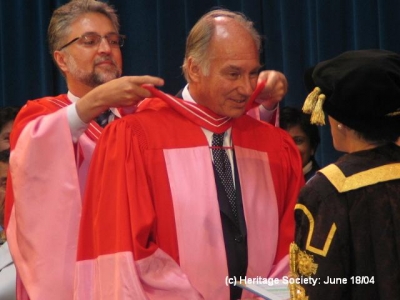Aga Khan: Universities Essential to Civil Society-2004-06-18
“Partnerships
between the developed and developing
world can and do work. Moreover, they
demonstrate how essential universities
and their lifeblood – you their graduates
– are to civil society.” Civil society,
meritocracy and pluralism are the bases
for true democracy said the Aga Khan to
the graduating class of University of
Toronto's Ontario Institute for Studies in
Education [OISE].
The Aga Khan, who gave the keynote
speech at the Governor General's
Leadership Conference last month in
Ottawa, received a degree of Doctor of
Laws, Honoris Causa, from U of T. In
his Ottawa speech, he shared his vision
for slowly cultivating democracy across
the world, partly through the help of
Canadian expertise.
In Toronto, in his Citation, President
Robert Bigerneau explained the reasons
for the special recognition: “Over five
decades, the Aga Khan has demonstrated
a profound personal commitment
towards improving the quality of life of
some of the most disadvantaged
populations on this planet,” he said. He
further recognised the contribution of the
Aga Khan’s organizations, such as the
AKDN, in promoting health, Education,
and Development projects in Asia and
Africa, including the operation of some
300 schools and 200 healthcare
institutions.
The Aga Khan practises what he
preaches. With 15 millions followers
spread out in 30 countries from Australia
to Zanzibar, he can afford to draw from
a large pool of qualified people to realise
his vision of a peaceful and intellectual
Islam which helps the world to become a
better place. Accompanying the Aga
Khan at the convocation was Firoz
Rasul. Rasul, who received his
Doctorate of Laws Honoris Causa in
2001 from Simon Fraser University, has
recently stepped down as CEO of
Ballard Corporation to take over a
challenging position with the Aga Khan
Museum of Islamic Art in Toronto and
with the Global Institute for Pluralism in
Ottawa.
Outside of the Convocation hall, many
Ismailis gathered to salute their spiritual
leader. Some had flowers in their hands.
Some came from as far as Los Angeles
and Vancouver to see him. He comes out
and smiles, visibly happy to see them.
Today he waves at his community in
Toronto. Next week, he will attend a
ceremony at which President Joaquim
Chissano of Mozambique will lay the
first stone in the construction of an Aga
Khan Academy in the southern city of
Matol, the second in an international
network of 20 such academies. A
different place, a different time... there
is no end to the Aga Khan’s work.
- 3104 reads
 Ismaili.NET - Heritage F.I.E.L.D.
Ismaili.NET - Heritage F.I.E.L.D.